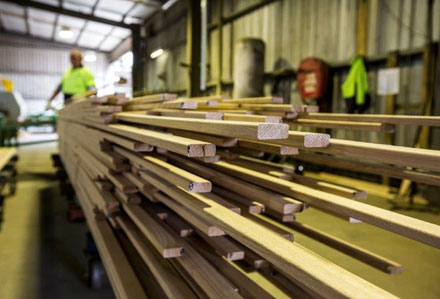
The board of Victoria’s Heyfield timber mill, which is at risk of closure because of supply issues, has agreed to a government request to delay a decision on its future. Source: ABC News, The Weekly Times
The Victorian Government asked the board of Australian Sustainable Hardwoods (ASH) to postpone its decision by a week, so the Government could continue to negotiate a deal to keep the mill open and its 250 workers employed.
The mill is dependent on a viable timber supply from the state-owned VicForests, but has no supply locked in beyond June.
The company rejected VicForests’ last offer of a short-term contract at half the current volume, which it described as unsustainable.
ASH has proposed receiving younger regrowth timber to boost supply but said that would involve processing smaller logs. It wants the Government to provide millions of dollars to refit the timber mill.
ASH director Clinton Tilley said it was a tough time for the people of Heyfield, east of Melbourne.
“It just puts strain on our workforce and it leaves anxiety around our staff, around the town and around the Latrobe [Valley] in general, which is not good for anyone,” he said.
“It’s very tight for us and it’s not only tight for us, it’s tight for the industry.
“Logging needs to be planned for the next season within the next four weeks. If that can’t be done the next season can’t start.”
Despite the tight timeline, Mr Tilley remained optimistic about the chance of striking a deal with the Government.
“The questions we’re receiving from government are leaving us very hopeful that they’re seeing the employment opportunities and needs of the town,” he said.
The ASH board also voted to close the mill for a day next week to allow staff to travel to State Parliament to participate in a rally in support of the mill.
Last month, about 1000 residents attended a local meeting in Heyfield and were told the area would become a “ghost town” if the mill shut down.
In the Weekly times Vince Hurley, chief executive of Australian Sustainable Hardwoods wrote a piece rebutting claims by Mr David Lindenmayer that had been published on 1 March in the Weekly Times.
Mr Hurley said: “I believe his analysis on the Leadbeater’s possum is similarly incorrect. The 2014 ASH contract did not take effect due to the change of government in Victoria at the time.
Sufficient timber exists to meet the requirements of ASH. Only 0.1% of public forests are logged annually, with 94% of forests excluded. The 6% of commercial regrowth remaining is being reduced further due to new, additional exclusion zones. The Government needs to change this situation to maintain the industry.
ASH advised the Government it wished to receive the current contracted volume into the future. If the Government chooses to include lower quality logs, ASH will need to significantly retool to allow for different sawlog specification. If ASH closes, $15 million of Government revenue (net GST, PAYG, payroll, company taxes etc), $14 million in wages, $24 million of payments to VicForests and numerous other benefits through the supply chain would be lost.
Mr Lindenmayer has repeatedly been asked for hard evidence supporting his claims the forest is being overcut, by me and by the secretariat of the Forest Industry Taskforce. He has consistently failed to do this. Why?
Mr Lindenmayer argues rapid transition to plantation timber is the solution. The existing sawlog plantations are softwood and are not a substitute for hardwood. He naively uses the example of New Zealand.
NZ is a large importer of hardwood species precisely because NZ plantations are softwood and not an appropriate substitute.
Tourism exists now and can grow hand in hand with the timber industry — it is not an “either/or” situation. Regional Victoria has been devastated by business closures and cannot afford the totally unnecessary closure of our industry.
His assertion that employment in the timber and downstream industries can simply be replaced by “many more people” in tourism, like his forestry “science”, is simply fantasy.”





